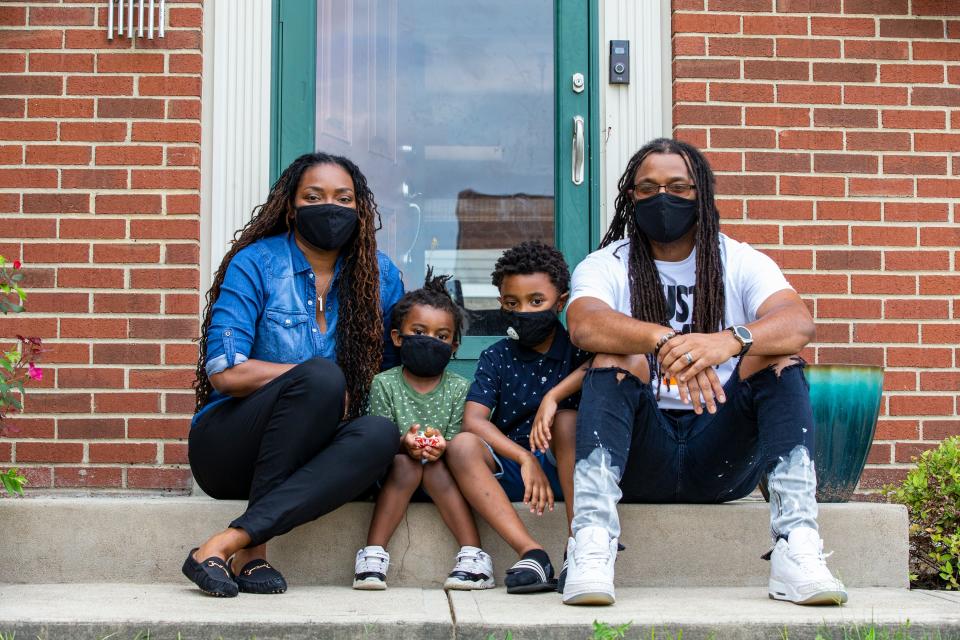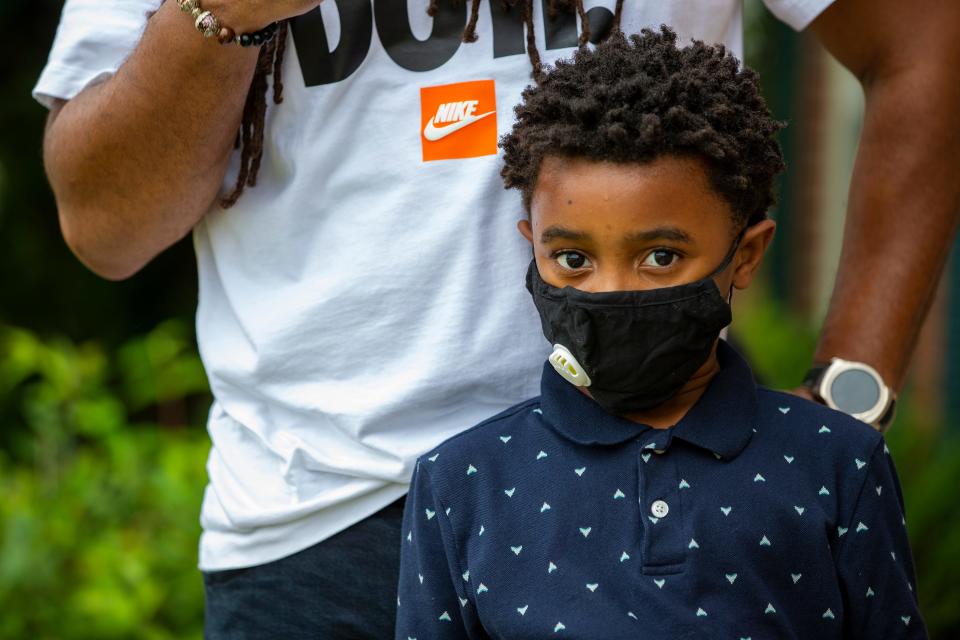'Supposed to be accepting': Ohio private school forces out Black children with locks, parents say

CINCINNATI – A few days ago, young Asten Johnson learned his school didn’t want him back, at least not the way he is now.
The 6-year-old has dreadlocks. When his hair is wet and he pulls on it, it comes down to about his eyes.
His parents, Christina and Nate Johnson, wear the same natural style, though their hair is much longer, extending in black and brown coils down their backs.
“(Asten) looks in the mirror every single day and tells me how long his hair has grown,” Christina Johnson said.
He wants his hair to grow fast. He wants to look like his parents.
Officials at his school want the opposite. Zion Temple Christian Academy in Cincinnati told the Johnsons that locks, a natural hairstyle for Black people, are not allowed at the school, Christina Johnson said, even though Asten was enrolled and wore the style last year.
The family planned to enroll Asten’s younger brother, 3-year-old Arrison, in the school this year. But “Arri” also has locks.
Their parents had to decide: comply with the school’s order or look elsewhere. They chose the latter.
These states are passing laws to stop discrimination: Banning ethnic hairstyles 'upholds this notion of white supremacy.'

“What’s disheartening about Zion Temple is it’s in the middle of a Black community, and it’s a predominantly Black school,” Christina Johnson said. “How can you not accept your own people?”
School officials did not return multiple requests for comment.
An amendment to Cincinnati's anti-bias law, approved last year by the City Council, bans discrimination based on natural hair. But the law exempts religious groups.
Video: Ohio state senator suggests ‘colored’ people get COVID-19 from not washing hands
This month, a school secretary emailed the dress code policy to Christina Johnson. The code bans boys from wearing “braids, design cuts or Mohawk hairstyles. Hair must be cut one inch short,” the email states.
Christina Johnson said school officials told her that her sons’ hair is unacceptable because of its length and style.
Black people have long faced discrimination for how they wear their hair.
In 2017, another Ohio teen was forced out of a Catholic high school in Toledo for his locks. Malachi Wattley, 17, recently told The Cincinnati Enquirer, part of the USA TODAY Network, that the school wasn’t accepting.
“They say come as you are, but I guess not,” he said.
This year, Texas high school student DeAndre Arnold was invited to the Oscars by Gabrielle Union and Dwyane Wade after facing a suspension for his dreadlocks.
And in 2018, a referee forced New Jersey high school wrestler Andrew Johnson to cut his locks before he could compete. The referee was later suspended for two seasons.
DeAndre Arnold: Texas teen banned by high school from attending graduation after refusing to cut dreadlocks
Andrew Johnson: Referee who made high school wrestler cut dreadlocks is suspended for two years
Cincinnati was the second city of the nation to make it illegal to discriminate against people with natural hair.
City Councilman Wendell Young said at the time that he wished he would “live long enough that there was no need to pass a rule or law, but we're not there yet.”
Last summer, California and New York became the first states to pass similar laws.
A campaign known as the Crown Act, an acronym for “creating a respectful and open world for natural hair,” was created in 2019 and aims to create protections from discrimination based on race-based hairstyles.
Christina Johnson said Zion Temple’s hair policy, with its reference to braids and designer hairstyles, is directed at Black children.
“I just don’t understand how you can be an African American facility that promotes kings and queens in the heart of a Black community, and then you discriminate against people who look like the community,” she said.
Asten told The Enquirer he loved attending Zion Temple last year, particularly when he and his classmates planted an acorn tree and later watched squirrels congregate around it.
But when asked how he felt, now that he couldn’t return there, he raised his forearm to his eyes and held it there before muttering a single word: “sad.”
Christina Johnson is enrolling Asten in a public school district. The family plans to send Arrison to a babysitter. This new, unexpected arrangement will extend Nate Johnson’s commute by about 90 minutes per day.
“I’m going do whatever I need to do for my kids,” he said. “It’s just unfortunate because of a hairstyle.”
But even if Zion Temple removed its hair policy, Nate Johnson wouldn’t want his sons enrolled there any longer.
“You’re supposed to be accepting,” he said. “Come as you are.”
This article originally appeared on Cincinnati Enquirer: Ohio private school discriminates against Black hair styles: family

